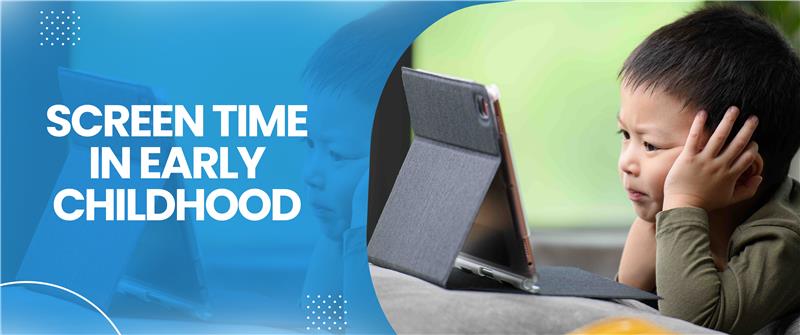Screen Time in Early Childhood
Children between the ages of birth and five years are at high risk if they engage in too much screen time. What is screen time? It means any time spent in front of a digital device with a screen, such as a cell phone, tablet, computer, or television.

In the first 5 years of life, a child’s brain is developing rapidly to form social and emotional skills to build relationships and healthy habits. Excessive screen time has a negative impact on brain development, especially during these critical years. Research has shown that children with excessive screen time (greater than 2 hours per day) will have impaired communication skills, impaired problem-solving skills, and impaired personal-social development. These impairments are further worsened when parents or caregivers also engage in excessive screen time. Many parents of children who engage in excessive screen time admit to not reading to their children. A practice that is crucial to early learning and brain development.
Recent studies have also shown that increased screen time in early childhood is associated with delays in cognition, language, and motor milestones. Further, increased screen time in early childhood is associated with behavior problems, attention deficit hyperactivity disorder (ADHD), conduct disturbances, and digital addiction that can persist and worsen in later childhood. Research also demonstrated that sleep is impaired by having digital devices in the child’s bedroom at night due to the blue light emitted by the devices. Lastly, related to digital gaming in children, as game addiction increases, the social and emotional development of the child decreases over time. Additionally, children with digital game addiction have a high incidence of aggressive behaviors. Now, if that has gotten your attention, you may ask, how much is too much, and what can parents and caregivers do to avoid these problems?

Best Practice
Parents must provide a good example of time management related to screen time. Supervised screen time is required throughout childhood for good developmental outcomes. Children require constant attention and nurturing, which is not possible if the parent or caregiver is engaging in excessive screen time themselves. Read to your child, hold them, play music and sing with them, play games with them, take walks, go to the park, teach them to create art, color, learn colors, shapes, how to identify objects, animals, loved ones, the ABCs, and 123s. They need to be exposed to textures, colors, warmth, hugs, and a human voice.
Recommended Screen Time Guidelines For Children
The American Academy of Pediatrics (AAP) recommends screen time guidelines for children based on age:
The AAP also recommends other guidelines, such as:
- Turning off screens during family meals, outings, and sleep time.
- Avoid using screens as pacifiers, babysitters, or to stop tantrums.
- Use parental controls on all devices.
- Develop a family media plan that considers each child’s age and needs, as well as family dynamics.
- Always co-view or pre-screen media with children to help protect them from content they aren’t ready to see that could be detrimental.
References and Additional Resources:
-
AACAP. (2020). Screen time and children. American Academy of Child and Adolescent Psychiatry. Retrieved May 27, 2024, from
https://www.aacap.org/AACAP/Families_and_Youth/Facts_for_Families/FFF-Guide/Children-And-Watching-TV-054.aspx%20 -
American Academy of Pediatrics. (2023, December 13). Where we stand: Screen time. HealthyChildren.org.
https://www.healthychildren.org/English/family-life/Media/Pages/Where-We-Stand-TV-Viewing-Time.aspx -
Narasimhan, U., Anitha, F., Janakiraman, A., Janakarajan, N., & Tamilselvan, P. (2021). Association of digital media exposure and addiction with child development and behavior: A cross-sectional study. Industrial Psychiatry Journal, 30(2), 265.
https://doi.org/10.4103/ipj.ipj_157_20 -
Center for Disease Control. (2024, May 15). Child Development. CDC.gov.
https://www.cdc.gov/child-development/positive-parenting-tips/infants.html#cdc_generic_section_2-positive-parenting-tips -
Şenol, Y., Şenol, F., & Can Yaşar, M. (2023). Digital game addiction of preschool children in the covid-19 pandemic: Social emotional development and parental guidance. Current Psychology, 43(1), 839–847.
https://doi.org/10.1007/s12144-023-04323-8 -
Narasimhan, U., Anitha, F., Janakiraman, A., Janakarajan, N., & Tamilselvan, P. (2021). Association of digital media exposure and addiction with child development and behavior: A cross-sectional study. Industrial Psychiatry Journal, 30(2), 265.
https://doi.org/10.4103/ipj.ipj_157_20